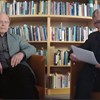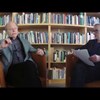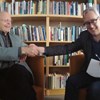millers
David Miller: Boundaries, Democracy and Territory
Professor David Miller, Nuffield College at the University of Oxford. ABSTRACT The paper I will be presenting asks the general question ‘What boundaries between political units ought there to be?’ Reje

The UK election and Brexit - David Miller and Gustaf Arrhenius
On midnight, the 31:st of January 2020, Britain left the EU. This was possible in part because the Concervative party won a landslide in the general election on December 12 2019. Why did they win so b

The UK election and Brexit - David Miller and Gustaf Arrhenius
On midnight, the 31:st of January 2020, Britain left the EU. This was possible in part because the Concervative party won a landslide in the general election on December 12 2019. Why did they win so b
David Miller - Controlling Immigration in the Name of Self-Determination
David Miller, Professor of Political Theory, FBA, Senior Research Fellow, Nuffield College Abstract States often justify their restrictive immigration policies by appealing to their right of self-determ

Liberal Nationalism - What is it? Why do we need it? Gustaf Arrhenius and David Miller
Liberalism and nationalism are in many ways contradictory positions. The ideals of open borders, free movement of people, goods and services, cosmopolitanism and internationalism that are associated w

Liberal Nationalism - What is it? Why do we need it? Gustaf Arrhenius and David Miller
Liberalism and nationalism are in many ways contradictory positions. The ideals of open borders, free movement of people, goods and services, cosmopolitanism and internationalism that are associated w
Liberal Nationalism - David Miller, Gina Gustavsson, Yael Tamir, Philippe van Parijs
Registration: The seminar is free of charge but you need to register: Click here The seminar will be held in English Several studies show that citizens in North America and Europe have strong emotional ti These questions are the focus of two new books: Liberal Nationalism and Its Critics, and Why Nationalism. We have the great honor to bring together the authors of these books on February 5: David Miller, Gina Gustavsson and Yael Tamir. They will together with political philosopher Philippe van Parijs discuss these topics. The evening is moderated by Lars Anell (Frisinnade klubben, former chairman at Swedish Research Council). Gustaf Arrhenius (Professor of Philosophy and Director at the Institute for Futures Studies) and Bengt Westerberg (Frisinnade klubben, former party leader of the Liberal People's Party) says welcome. : Professor of political theory, Oxford University. The one person most associated with the term “Liberal Nationalism”. Recently published Liberal Nationalism and Its Critics with Gina Gustavsson. : Associate Professor of political science, Uppsala University and Nuffield College, Oxford University. : PhD in political theory, Oxford University. Wrote the much talked about book Liberal Nationalism in 1993. Recently published the book Why Nationalism. Political philosopher from Belgium, one of the world’s most prominent scholars on Universal Basic Income (UBI).
From Transfers to Individual Responsibility: Implications for Savings and Capital Accumulation in Taiwan and the United States
A demographically realistic model incorporating life cycle saving motives is used to simulate effects of changing a transfer-based old-age support to a funded system, applied to the cases of Taiwan an
Studies on the boundary problem in democratic theory
Working papers 2022:1-11 Editor: Paul Bowman Proximity Principle, Adieu Robert E. Goodin Reconceiving the Democratic Boundary Problem David Miller The Boundary Problem and Platitudes About Democracy: A Conc
Just allocation of Covid-19 vaccines
BMJ Global Health 6: e004812. 2021 ABSTRACT Authorized COVID-19 vaccines must be distributed fairly. Several proposals have emerged offering guidelines for how to do this. However, insofar as the aim is A total of 182 countries have joined the facility so far, which has secured about US$2 billion for its advance market commitment (AMC). The AMC will allow 92 low-income and middle-income countries to obtain vaccine doses as they are approved or authorised. Currently, COVAX is set up so that in a first phase poor countries can vaccinate 3% of their populations, while rich countries can vaccinate up to 50%. Though the facility hopes to allow all members to vaccinate at least 20% of their populations by the end of 2021.Other proposals by theprioritising healthcare workers, the elderly and, those with comorbidities that put them at greater risk of severe illness if infected with COVID-19, people from certain high-risk sociodemographic groups and some teachers.








